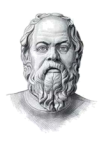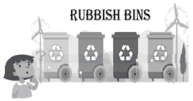The earth is a ________ (行星), which goes around the sun.
I have poor eyesight. I can’t see the blackboard ________ (清晰地).
Sam has lost his k________ to the door. He can’t get in now.
Pandas are black and w________. They feed on bamboo.
Hurry up! The movie will b________ in ten minutes.
阅读下面短文,按要求完成下列各题。

Socrates was famous in ancient Greece for his knowledge. One day, one of his friends went up to him and said, “I’ve just heard something about your friend, do you want to know?”
“Well,” Socrates said, “Before telling me anything, I’d like you to pass a test. It’s called the triple filter (三重筛选) test.”
“Triple filter?”
“That’s right,” Socrates continued, “Before you talk to me about my friend, it is a good idea to think about what you will say. The first filter is ________. Are you sure what you are going to tell me is true?”
“In fact, I just heard about it and…” the man said.
“All right,” Socrates said, “So you don’t really know whether it’s true or not. Now let’s try the second filter—goodness. Is what you are going to tell me good?”
“No, on the contrary (相反)…” the man replied.
“Okay,” Socrates continued, “The last filter is usefulness. Is what you are going to tell me useful to me?”
“No, not really.” The man said.
“Well,” Socrates ended, “If what you want to tell me is not true, good or even useful, why tell it to me at all?”
(1)Why did the man go up to Socrates one day? (根据短文内容回答问题)
_________________________________________________
(2)How many questions did Socrates ask the man? (根据短文内容回答问题)
_________________________________________________
(3)According to the story, what do you think of Socrates? (根据短文内容回答问题)
_________________________________________________
(4)根据短文内容,给下面的句子补充一个单词,使句子意思完整。
The first filter is ________.
(5)根据短文内容,完成句子。
This story teaches us ________________________________.
根据对话内容,从选项中选出能填入空白处的最佳选项,其中有两项为多余选项。
Host: Hello, Ailing, welcome to our Sports Talk. Glad to see you.
Gu: Nice to see you, too.
Host: Ailing, you won three medals in Olympics at the age of 18. ___(1)___
Gu: Well, that’s because of my habit. ___(2)___
Host: Have you got any difficulties?
Gu: Of course! ___(3)___ However, I like challenges (挑战).
Host: ___(4)___ By the way, apart from sports, what else do you like?
Gu: I love fashionable clothes, so that’s why I am also a model.
Host: Wow, it seems that you are able to do everything well. ___(5)___
Gu: You’re welcome.
| A. |
How brave you are! |
| B. |
Do you have any future plans? |
| C. |
I often fall over and get hurt during practice. |
| D. |
Could you share the secret of your success? |
| E. |
When did you compete for the first time? |
| F. |
Thanks again for your coming, Ailing. |
| G. |
Whatever I do, I will put 100% energy into it. |
阅读下列语言材料,根据语言材料的内容,从每小题所给的A、B、C三个选项中选出能回答所提问题或完成所给句子的最佳选项。

Do you ever find yourself standing in front of rubbish bins, not sure whether the piece of waste in your hand is recyclable or not? To solve this problem, four Hong Kong high school students have invented a smart rubbish bin that uses AI to sort(分类) the waste. The students named the bin Waste Collection Point.
Connected to a computer, the bin uses a camera to tell the kind of the waste it receives and sorts it into plastic, paper, glass, or other kinds. To make sure the bin can sort waste correctly, the team tested every product in the school shop and took at least500 pictures of each one. “To train the AI, we had to take many photos from different angles(角度), so it has a better rate of accuracy,” said one of the students who built the AI system.
The idea of the smart bin was born two years ago, when the students were in Grade Ten. At that time, people from the city crowded into their village because of the COVID-19. They left behind a lot of rubbish and caused more pollution.
“All the bins were full, and there was even rubbish on the mountain,” the students recalled, “Every weekend, we had to join the villagers in picking up the waste.”
The students decided to develop a special recycling bin that would encourage people to protect the environment. Although school ended at 2 pm, the team would continue to work on their invention until 6 or 7 pm at school. Even when their school was closed last year, they would still meet and work together online.
“Our bin is now in its third generation(代). Before graduation, we hope it can be widely used in the city.” The students said, “Then it will be easier than ever for people to recycle and protect our environment.”
(1)According to the first paragraph we know the ________ of Waste Collection Point.
| A. |
price |
B. |
size |
C. |
use |
(2)The underlined words “rate of accuracy” mean “________” in Chinese.
| A. |
精准度 |
B. |
参与度 |
C. |
知名度 |
(3)This chart shows why Waste Collection Point was developed. Which is the missing part?

| A. |
the hit of the COVID-19 |
B. |
villagers’ encouragement |
C. |
picking up rubbish around |
(4)This passage is mainly about ________.
| A. |
four young inventors |
B. |
a new invention |
C. |
the rubbish problem |
(5)How is this passage organized(组织)? (P=Paragraph)
| A. |
|
B. |
|
C. |
|
阅读下列语言材料,根据语言材料的内容,从每小题所给的A、B、C三个选项中选出能回答所提问题或完成所给句子的最佳选项。
Yang Hongwei, 56, was born into a kite-making family in Weifang. When she was young, she often saw kites with bright colors and different shapes in her grandfather’s workshop.
“Every time I see these beautiful kites, my bad feelings go away,” said Yang.
Yang learned to make kites from her grandfather at the age of 16. After practicing the skill for 10 years, she started her own shop in 1992.
“Many places around the world have a tradition of flying kites,” Yang said. “But I think the cultural idea behind our kites is special.”
On Yang’s kites, people can see not only common pictures like butterflies and birds, but also some prints telling Chinese myths, legends and history. For example, she once made a kite with a phoenix(凤凰). On each side of the phoenix were 50 images(形象) of famous women from Chinese history. Each woman was different in look, clothes and makeup.
“It took me a lot of time,” Yang said, “but when I explain the stories of the kites to foreigners, I feel a great sense of achievement.”
In her free time, Yang travels to countries such as Germany, Australia, the United States and New Zealand. She tells the stories of Chinese kites and the traditional ways they are made. “It is an important job of mine.” She said.
(1)Yang Hongwei saw some beautiful kites in her ________ workshop when she was young.
| A. |
uncle’s |
B. |
father’s |
C. |
grandfather’s |
(2)Yang Hongwei started her own shop at the age of ________.
| A. |
16 |
B. |
26 |
C. |
56 |
(3)The example of Yang’s kite with a phoenix is given to show ________.
| A. |
how she makes kites |
B. |
why she likes kites |
C. |
what’s in her kites |
(4)From the passage we can know Yang Hongwei is ________.
| A. |
creative |
B. |
humorous |
C. |
honest |
(5)Yang’s important job refers to(指) ________.
| A. |
spreading Chinese culture |
B. |
traveling abroad |
C. |
selling more kites |
阅读下列语言材料,根据语言材料的内容,从每小题所给的A、B、C三个选项中选出能回答所提问题或完成所给句子的最佳选项。

(1)You will visit ________ on this tour of Hainan.
| A. |
Haikou and Qionghai |
B. |
Wenchang and Wanning |
C. |
Qionghai and Sanya |
(2)During the trip you can enjoy ________.
| A. |
surfing |
B. |
camping |
C. |
shopping |
(3)The cost includes the following EXCEPT ________.
| A. |
free plane tickets |
B. |
fresh seafood |
C. |
nice hotels |
(4)What is the right time to book the trip on the phone?
| A. |
8: 30 am on Monday. |
B. |
6: 30 pm on Friday. |
C. |
3: 30 pm on Saturday. |
(5)Where is this reading material(材料) probably taken from?
| A. |
A newspaper. |
B. |
A novel. |
C. |
A diary. |
阅读下面短文,掌握其大意,从每小题所给的A、B、C三个选项中选出最佳选项。
There was once a couple named Sue and John. Both of them were ___(1)___.
In the late autumn, John was badly ill and became bedridden (长期卧床的). After the doctor visited John several times, he told Sue, “His condition is quite ___(2)___. John seems to have lost all will to live. If he doesn’t want to live, medicines will not help him.”
Sue tried her best to ___(3)___ John. She sang and danced, she painted their favorite pictures, she told jokes, but John did not respond (回应).
“Five,” he said ___(4)___ one day, as he looked out of the window. When Sue asked what John meant, he explained slowly. “There are… only ___(5)___ leaves left on the tree now. When the last leaf falls, I... shall go with ___(6)___.” Upon hearing this, Sue couldn’t help crying. She went to their neighbor, Mr Smith, who was also an artist.
Mr Smith was sorry about John’s poor health. He ___(7)___ his friend to get better, then he painted a leaf.
Over the next few days, it rained heavily, but the last leaf on the tree held on firmly (坚固地). Every day, John would look ___(8)___ and see the same lone leaf on the tree.
Then, one day, the doctor came in and said John’s ___(9)___ was improving. John said to Sue, “I’ve realized that life is hard, but I shouldn’t give up. That leaf has stayed on that tree for so long. It has taught me to ___(10)___!”
The doctor smiled, so did Sue.
(1)
| A. |
teachers |
B. |
artists |
C. |
doctors |
(2)
| A. |
terrible |
B. |
common |
C. |
simple |
(3)
| A. |
cheer up |
B. |
talk about |
C. |
listen to |
(4)
| A. |
angrily |
B. |
proudly |
C. |
quietly |
(5)
| A. |
four |
B. |
five |
C. |
six |
(6)
| A. |
it |
B. |
them |
C. |
you |
(7)
| A. |
taught |
B. |
wanted |
C. |
asked |
(8)
| A. |
up |
B. |
down |
C. |
out |
(9)
| A. |
condition |
B. |
ability |
C. |
level |
(10)
| A. |
draw |
B. |
wait |
C. |
live |
Look at the notice. It says ________.

| A. |
we can’t swim without a shower here |
| B. |
we can’t use the new shower |
| C. |
we can’t go to the pool |
—Have you decided ________ the children in the poor area?
—By sending them books and schoolbags.
| A. |
how you will help |
B. |
how will you help |
C. |
when you will help |
Few students could understand the sentence until it ________ by Miss Chen.
| A. |
explained |
B. |
was explained |
C. |
was explaining |